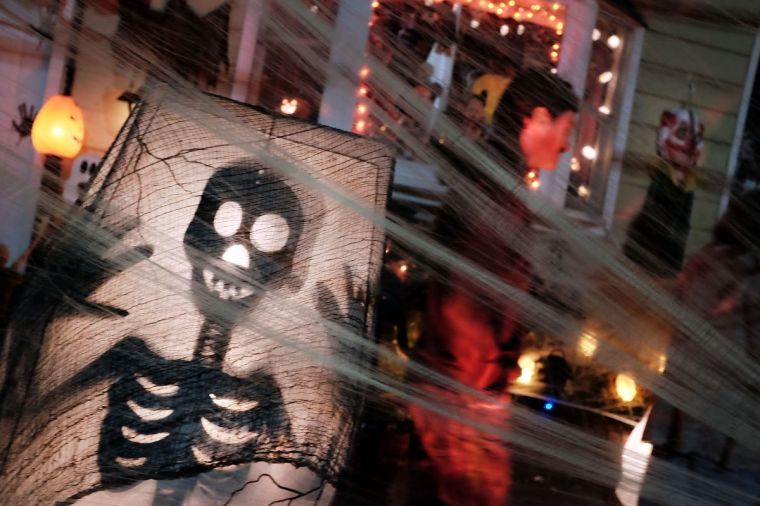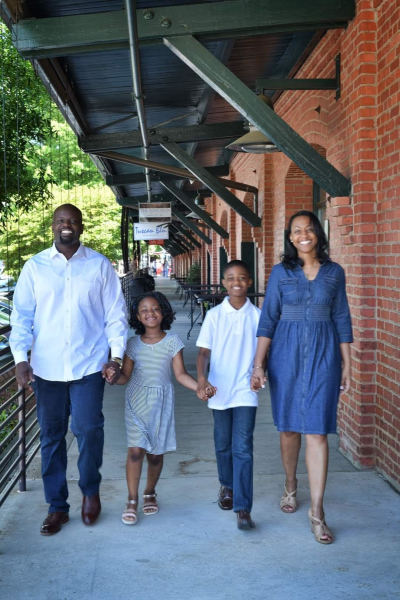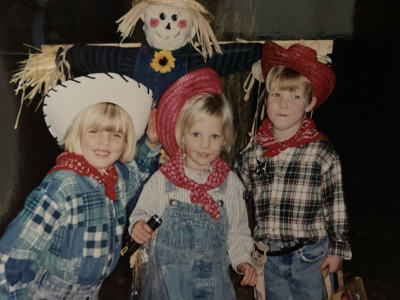Some pastors see Halloween as ‘innocent’ fun, others view the holiday as ‘demonic’
Halloween #Halloween

 People trick-or-treat in a Brooklyn neighborhood in New York City. Throughout the country on Oct. 31, children and adults nationwide are dressing-up in costumes to both scare and entertain as they celebrate Halloween. | Spencer Platt/Getty Images
People trick-or-treat in a Brooklyn neighborhood in New York City. Throughout the country on Oct. 31, children and adults nationwide are dressing-up in costumes to both scare and entertain as they celebrate Halloween. | Spencer Platt/Getty Images
As most Americans plan to celebrate Halloween on Monday night, many Christian parents will try to keep their children from being exposed to occultic ideas like witchcraft, demons and evil spirits. But other Christian families will embrace the time for candy, costumes and fun.
Many pastors and churches urge members to avoid the annual observance altogether or suggest alternative activities like harvest festivals. However, others are less bothered by Halloween even though they acknowledge its pagan origin.
In a series of interviews, The Christian Post asked pastors with children of their own about how their families approach Halloween.
Most of the church leaders interviewed say they do not celebrate Halloween because it originated from the ancient Celtic festival of Samhain. The celebration was traditionally held halfway between the autumn equinox and winter solstice and is seen as a period when the veil separating the world and the spirit realms is at its thinnest.
But some are more open to allowing their children to participate in what they believe has become a watered-down, commercialized version of the holiday.
In their perspective, the last day in October has adopted a new meaning over time by becoming more about costumes, trick-or-treating and carving pumpkins than a celebration to ward off evil spirits.
As polling shows that 78% of Americans plan to celebrate Halloween this year, a recent survey from Lifeway Research of over 1,000 Protestant pastors finds that only 13% say they urge their congregations to avoid celebrating Halloween altogether, up from 8% in a 2016 survey.
Seventy-one percent of pastors say they encourage their church members to invite friends or neighbors to church events on or near Halloween, such as a fall festival, trunk-or-treat or judgment house. About a third of pastors (34%) encourage their members to give out “tracts to trick-or-treaters.”
Charles Washington, the pastor of Regeneration Temple in Raleigh, North Carolina, said he doesn’t celebrate Halloween with his two children — Nathan, 11, and Taylor, 8.
“My family believes it’s wrong after we conducted research to better understand the origins,” said Washington, whose church belongs to the Church of God in Christ denomination.
“And as Christians, we are called to be ‘the light of the world.’ And as we know, this is a day that is for the celebration of evil spirits.”
 Pastor Charles Washington and family | Courtesy Charles Washington
Pastor Charles Washington and family | Courtesy Charles Washington
Even though Washington grew up in a Christian home, his family did not teach him about the origins of Halloween right away. He recalls celebrating the holiday as a child on one occasion.
The following year, his family became aware of the celebration’s origins and stopped celebrating.
“Some people celebrate it based on ignorance and not knowing the origins. Growing up, I didn’t know the origins of Halloween. I just thought it was a date that we all dressed up, and I grew up in a Christian home,” he said. “But as I got older and I got wiser, I researched and I understood. This is not a day that Christians participate in.”
Over 2,500 years ago, the Celtic festival of Samhain was believed to have taken place at dusk on Oct. 31 annually. Celtic communities in Europe celebrated for about three days, starting on the 31st. They would light bonfires, wear costumes and spend the evening summoning the spirits of the dead.
The Celts are believed to have called on the spirits to come and roam throughout the Earth. The costumes are believed to have been worn because they thought the disguises would keep the “evil” spirits from recognizing them.
“It’s a pagan holiday that honors ancestors going back to the Celtic people who are known as the Celts,” Washington said. “They would honor this day. Witches would honor this day, honoring the dead. A lot of it was a festival that was created to appease the spirits of the dead.”
Children ‘susceptible’ to Satan
Washington believes Halloween can never be separated from its origins, and Christian parents who celebrate Halloween in any way with their children are likely to make themselves and their children more “susceptible” to the negative impact of the devil and his plots, schemes and evil plans carried out through his demons on that night.
“This day is supposed to be a gateway between the dead and the living. And at this time, it is easier, or it is more possible, for dead spirits to interact with human beings. So with all that being said, according to our Christian belief, to celebrate Halloween is to drink the cup of the devil,” Washington asserted, quoting 1 Corinthians 10:21, which warns that it is impossible to “partake in the Lord’s cup and the cup of devils.”
During Halloween, Washington said, it is believed by witches and warlocks that the veil that separates the demonic realm from the earthly realm is thinner than usual, which can make the ability for those practicing witchcraft to have access to more of the demonic realm.
It’s important for Christian parents to be aware that “Christians are in spiritual warfare all the time,” according to Washington.
“The Bible tells us in Ephesians 6:12 about how we ‘wrestle not against flesh and blood, but against spiritual wickedness,’” Washington added. “So, at all times, we are wrestling with this. But, if this day is dedicated to that, for witches and warlocks to be even stronger, and to call on those evil spirits, even more, you don’t know what could happen.”
Washington said, “anything that a Christian does that is idol worship, that is not godly, you are more susceptible to demonic spirits.” The pastor warned that celebrating evil spirits could lead to something tragic.
“You never know what can happen with this type of celebration,” he warned.
The Lifeway survey found that African-American pastors (32%) were almost three times more likely than white pastors (11%) to say they encourage their congregations to avoid Halloween celebrations completely. About a quarter of Hispanic pastors (24%) agreed. Non-denominational (22%) and Pentecostal (20%) pastors were over twice as likely than Lutheran (9%), Methodist (7%) and Church of Christ (7%) pastors to say they urge their congregants to avoid Halloween.
A ‘candy acquisition’
John Reichart, one of the pastors at The Experience Vineyard Church in Rockville Centre, New York, believes Halloween can be separated from its origins because it’s a day that has adapted over time to become “mostly innocent.”
Reichart told CP he recognizes there is a dark side to Halloween dating back to its origins and present day.
But he believes it is possible for Christian parents to separate Halloween from demonic activity by teaching their children to avoid the holiday’s dark side. The pastor has three children in their late 20s and early 30s with whom he once celebrated Halloween.
 Pastor John Reichart’s children pose for pictured on Halloween in this undated courtesy photo. | Courtesy John Reichart
Pastor John Reichart’s children pose for pictured on Halloween in this undated courtesy photo. | Courtesy John Reichart
“When our children were very young, before they were old enough to think about going out trick-or-treating, we were able to bring them to a church that hosted a harvest party where they could dress up and gather with other Christians for fun activities. They didn’t call it a Halloween party,” Reichart said.
Though waves of immigrants brought many Celtic traditions to America, Reichart said there have been generations of adaptations of Halloween. Over the decades, he says, the holiday has become more of a “candy acquisition.”
“I am aware of the Celtic origins and the spirituality and fear aspects that were woven into it. … I am familiar with the details there, particularly what the Roman Catholic Church started doing to essentially co-opt some of those harvest time festivals that the Celts were celebrating where they viewed there is a thin barrier between the living and the dead and that people in the community that was dead might appear and need to be appeased,” Reichart stated.
Reichart said Halloween should be a time for Christians to be keenly aware that the spiritual realm exists in both a heavenly way with the Holy Spirit and a demonic way with Satan and his demons.
When his children were younger, Reichart allowed them to dress up and go trick-or-treating. But he prohibited any costumes viewed as “gory or overtly gullish or occult and on the demonic side.”
“It’s a holiday that goes along with the residuals of some spiritual aspects. There is a layer here that remains created by the commercial costume that’s available and through the frightening Hollywood movies that have been created. But at the kid level, they could dress up as crazy funny things where they are trying to look like some celebrity. But not in those gruesome ways.” Reichart stated.
“In that way, we tried to protect our kids and educate them about this topic and the origins a bit. I don’t minimize the reality of there being a rich spiritual world with the presence of the Holy Spirit and the presence of demons and Satan. But, I don’t believe that going to a Halloween festivity is demonic and that if someone does, they will be unduly influenced by demonic spirits.”
Join thousands of others to get the FREEDOM POST newsletter for free, sent twice a week from The Christian Post.